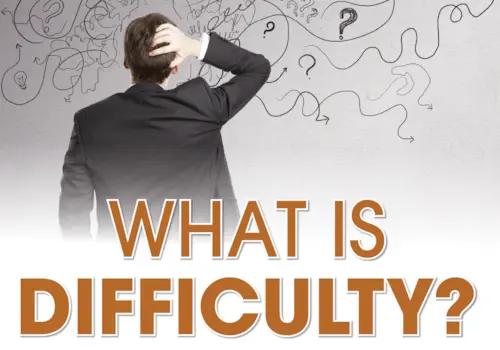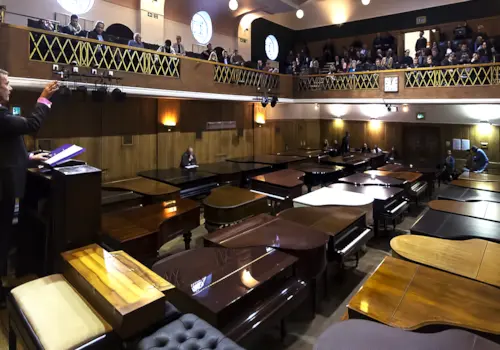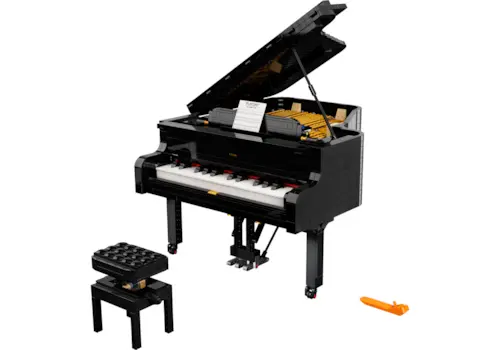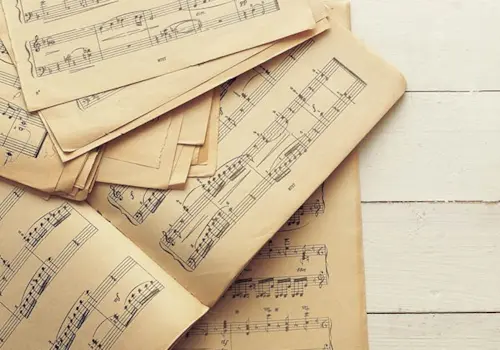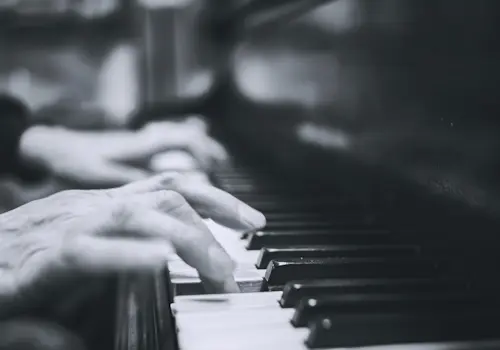22 August 2025
|
Whether you’re a child beginner, an adult first-timer, or a returner hoping to rekindle a spark of early talent, Warwick Thompson investigates your options.
The crazy, overly demanding, and potentially damaging piano teacher is something of a cliché in film and fiction. Bernice Rubens described such a character in her novel Madame Sousatzka, which was memorably turned into a film starring Shirley MacLaine. (Apparently the novel was loosely based on the experiences of the author’s brother, the pianist Harold Rubens.)
Or how about Erika Kohut, the sexually unhinged, sado-masochistic and utterly bonkers protagonist of Elfride Jelinek’s novel The Piano Teacher? In her case, it was Isabelle Huppert who did the honours in bringing all her neuroses – rather revoltingly - to the silver screen.
And let’s not forget the real-life teachers who have less than stellar reputations too. Stephen Hough sometimes speaks about his time studying at Juilliard with the legendary Adele Marcus, who has been described as a ‘destructive and vindictive’ personality. He says that while he and she actually got along reasonably well, he saw her ‘reduce other students to tears from personal humiliation in masterclasses… I think she was crueller to her female students than male ones.’
You might think ‘Well, I would certainly never put up with that sort of nonsense – I’d just leave,’ and if so, I applaud you. But the waters are somewhat muddy around this subject. One person’s overly strict disciplinarian is another’s ideal mentor.
While there should be no place for abuse in any form of relationship, what seems like abuse to me may just be appropriate firmness to you.
And it might take time for you to decide which it is: should you give the benefit of the doubt, or trust your instincts?
Those are tricky questions to answer. But here’s an illuminating little snippet about the subject which I found on an online piano forum.
I was starting to play at 15 and self-taught for a while. My first teacher was more of a kids’ teacher who had me play easy stuff. I felt uninspired and I didn’t feel respected.
My second teacher was a professor at a nearby college, who took one look at my playing and almost seemed offended by it. He absolutely tore me apart.
I loved it.
He took me seriously enough to care, and I progressed quickly because I felt challenged.
Ultimately then, it’s a case of horses for courses. You have to find the right teacher for you – or for your child. But how do you go about that? And how do you avoid ending up with someone who seems exciting enough to start with, but after a while ends up leaving you feeling like a squeezed-out dishrag at the end of each session?
Whether you are a beginner, a returner, an adult, a child, or someone living hundreds of miles from the nearest teacher, we’ll explore the ways in which you can discover your potential guru and discover how best to evaluate them.
Three main avenues exist to explore when trying to find tuition. First there are pre-recorded online tutorials, which you can find on YouTube and elsewhere. Secondly, there are live online lessons via Zoom or Skype or other platforms such as webinars etc. And thirdly, there’s good old-fashioned face-to-face learning with a real, living breathing teacher sitting next to you.
There are advantages and disadvantages to all three methods and hopefully knowing what they are will help you find the right path – or even how to do a bit of mix’n’match pathswapping along the way.
RECORDED TUTORIALS
Let’s start with online tutorials. The main advantage is pretty obvious: the majority of these are free, and easily available after about a microsecond’s searching on YouTube or Google. You’ll easily find the level to suit you, pretty much up to diploma standard.
Lessons online are in abundance; beginning with ‘How to find middle C’ right up to ‘Best ways to practise Chopin’s études’.
You can try out the clips of a teacher whom you find congenial, and if you find it’s not working for you, you can do another microsecond’s worth of googling and find another.
And you can pause, rewind, and repeat as often as you like.
Disadvantages exist too, of course. What if you’re a beginner and making a mistake in your posture, or hand-shape? Or you are getting hold of the wrong end of an explanation, and misunderstanding it? How will you know?
You can’t ask, obviously: and there’s no instant in-person feedback to let you know what’s wrong.
There’s a distinct chance that you might develop unhelpful techniques which will take a lot of effort to correct, should you decide to progress with more formal lessons later.
Another disadvantage is that these sorts of lessons are primarily aimed at beginners and lower-intermediate students. The more advanced films (such as the ones I found dealing with Chopin) tend to deal with technique only. This can be enormously helpful on a mechanical level of course, but less so on an interpretative level.
You’ll find less here that will help expand your ideas of phrasing, architecture, or musicality – ideas towards which a good teacher will guide you, to help you find your own artistic voice.
But if you simply want the basics, and are not so concerned about reaching higher levels later on, then these sorts of tutorials are gold.
I haven’t made any sort of exhaustive study, but here are a few sites which seem promising for beginners. You could look at teds-list.com, creativepianoacademy.com, pianolessonsontheweb.com, hoffmanacademy.com, or, for a more pop-music approach, have a gander at the YouTube channel Pianote (which also offers online tuition).
There's also dozens of online piano lessons catering to all levels on Pianist’s YouTube channel. Such pianist-teachers as Graham Fitch (pictured above at the piano), Tim Stein and more, make for compelling viewing.
ONLINE LESSONS
Now let’s look at online one-toone lessons. One of the main advantages is the fact that you don’t have to travel to the teacher’s house, so for people who live in remote areas, or who have mobility problems, this could prove to be a lifeline. And it certainly saves a certain amount of time, whatever your circumstances.
You also have your lesson on the same piano upon which you’ve been practising, rather than on the teacher’s instrument: the familiarity might feel more comforting for some people. And of course, during the lesson you will receive targeted feedback and constructive criticism, directed at your specific needs and aims. You can ask questions, obviously. And you have the option of recording your lesson, so that you can recapture any advice which might not have sunk in immediately.
So, it’s clearly a much more proactive way to learn – and certainly one which has gained in popularity since the pandemic – but there are drawbacks too.
Quite a few online teachers have described the difficulties of preparing an adequate camera set-up, both for themselves and the student. Sometimes the camera might need to be moved to show your hands in close-up, or moved again to show the score, or your feet on the pedals, leading to a break in concentration. Unless you and your teacher have Hollywood-style equipment, the sound quality might not be optimum either.
The teacher will not be able to scribble helpful notes on your score, but will have to send them later, so that a certain spontaneity is lost.
Another possible problem might arise from the place in which your piano is situated. If (as in most cases) it’s in a communal part of the house such as the living room, you will need to be able to clear the space for your own use during the lesson.
Also, if a teacher wanted to show you physically how to move your wrist, or pass your thumb under, or cope with a certain passage of music, you will be at a disadvantage.
And this leads to something more intangible: the loss of all the other little physical things – a scent, an eye-roll, a shrug, a smile, a frown – which go to build interpersonal relationships, and which give flavour to human interaction.
But despite those drawbacks, for certain students the possibility of online teaching will nevertheless be a godsend. The way in which you can find a suitable teacher for web-based lessons is the same as for finding one in person, so I’ll quickly deal with this third option before returning to the best methods of searching.
FACE-TO-FACE
The advantages of traditional face-to-face teaching are pretty much the same as those for the online route, of course, with the incalculable advantage of physical help with posture, hand position, weighting and the like. And you can discuss the possibility of recording your lesson too, for future reference: some teachers do this anyway, to avoid the possibility of accusations of inappropriate behaviour from students.
Disadvantages? In the majority of cases, you will have to be able to travel to the teacher’s studio, adding time, cost, and effort to the process (sometimes they will come to you, but that can be rare). If it is your child who is learning, you might be encouraged to sit in on the lesson to act as chaperone: listening to a child’s early steps on the piano, week in and week out, is hardly even the most devoted adult’s idea of fun.
Where might you find your online or in-person teacher? Naturally, the internet is a goldmine, and Google will undoubtedly be your first port of call.
There are two popular sites on which teachers advertise their services: eptauk.org (The European Piano Teachers’ Association UK) and ism.org (The Independent Society of Musicians).
The search function on the latter site is not immediately obvious, but if you look at the drop-down menu ‘About’ you’ll find the ‘ISM Music Directory’, which is where you can find the local teachers list.
The exam board Trinity offers an easy-to-navigate teacher directory, which will be worth sounding out. Another more general site is superprof.co.uk, but it has a large database of piano teachers listed by area.
There are many other portals too, which are easily found through any search engine.
You could also try your local library: they often have notice-boards, local directories, and armies of librarians who enjoy nothing better than helping with enquiries.
Why not check your local press too to see if any piano recitals are scheduled near you? You could approach the performer after the performance, and find out if they know of any local teachers. Is there a music shop nearby? It would be an obvious port of call too.
CONCLUSION
But then, once you have your list of options, how do you decide whom to choose?
The first question (although not necessarily the decisive one) should be about their professional qualifications: and by this, I mean their teaching qualifications, not their performance diplomas.
A great performer does not necessarily (note that qualification) make the greatest teacher, although he or she might still prove to be an excellent choice.
But if the teacher is qualified, how long have they been teaching? Do they have the experience of working with adults, if that’s what you require, as well as children? Does the teacher have a dedicated studio, with a good piano? If so, it certainly shows the level of dedication to, and investment in, their craft.
It may be that the person who is teaching is doing it instead as a side-gig, in a converted bedroom, using an inferior instrument: that might work for you too, but these are issues to be aware of.
Ask if you can talk to some of the teacher’s existing or former students, to get an idea of his or her modus operandi. Be as clear as possible about your aims too when you meet a teacher.
If you say, ‘I’m here because ultimately I want to be able to play Cardi B’s amusing song WAP on my out-of-tune piano’ and your teacher looks as if you’ve just offered to vomit on their cat, then you know immediately you’ve made the wrong choice. If they reply, ‘Oh heavens yes, Cardi B, such a fascinating composer, I’m sure we can work on that,’ then you’ve got past the first hurdle.
So, think what you want to achieve: play a Bach fugue? Impress your friends with a simple song? Learn jazz improvisation? Play Carnegie Hall?
The clearer you are, the better, and then the better you can evaluate your prospective Svengali.
Asking for a trial lesson is an excellent idea too. Sometimes teachers give these sessions gratis, but it shouldn’t be expected. It is an even better idea as well, if you have the stamina and energy, to try out a few teachers before you decide to commit to one.
Let them all know that that is your intention, of course: and if any of them become offended, then you can eliminate that person from your list immediately. Any good teacher will want what is best for their pupil, and if another teacher can provide it better than they can, they should be content.
Once you’ve chosen your teacher, suggest a trial period too: say, three months. Discuss with the teacher what they think can be accomplished within that period, in the direction of your goal. If after three months you’re only marginally nearer that goal, but have enjoyed the lessons and are making progress, all well and good.
But if you’re no nearer and also dread dragging yourself to weekly sessions of musical torture, then it’s clearly not working. Time to change is here. A teacher is actually a human being – surprising as that fact may sound – with foibles, prejudices, blind spots, strengths and wonders within them.
If those foibles and wonders don’t align with yours, it doesn’t mean you’ll never progress at the piano. It simply means you’ve had the wrong teacher (or rather – to spin the mirror – it means your unfortunate teacher had the wrong student.) But don’t let it dishearten you.
Think of it as an opportunity: you will find another teacher, and at least now you know whom you don’t want.
Win-win! Good luck in your search!
START LEARNING NOW WHILE YOU’RE DOING YOUR RESEARCH:
Watch lessons for beginner pianists on Pianist’s YouTube channel, where experts Tim Stein and John Maul teach everything from how to sit correctly at the piano to learning Bach’s C major Prelude.
Watch past and present webinars by becoming a member of Pianist Prime or Pianist Prime Plus.
You will find some beginner-level pieces inside Start Playing Piano and If you are in search of more, there are many simple pieces to explore inside past issues of Pianist magazine. Further information at www.pianistmagazine.com.

